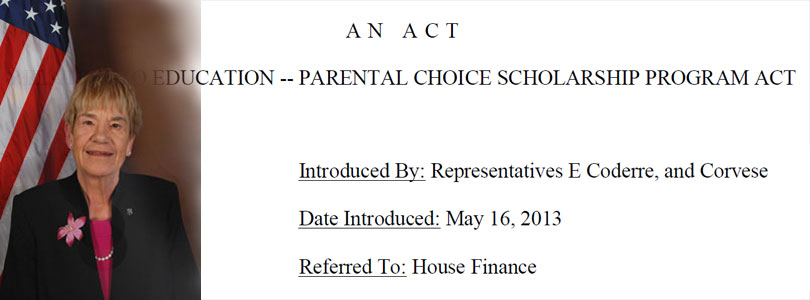Substantive School Choice Legislation
How about a hopeful note for a dreary Friday afternoon in the waning weeks of the legislative session?
Courtesy House Speaker Temorare Elaine Coderre (D, Pawtucket) and Deputy Majority Leader Arthur Corvese (D, North Providence) comes H6131, the “Parental Choice Scholarship Program Act.”
Basically, the legislation would give parents the lesser amount of the cost of tuition at any participating Rhode Island school or the per-student cost of their home public school districts to put toward tuition. Participating schools could be either public or private schools, in all of the variations of each. In the great majority of private-school cases, the financial arrangement would leave public schools with thousands of dollars for students whom they don’t have to teach.
The size of the scholarships would vary by income. Families with income that qualifies them for the federal free or reduced-price lunch program would receive the full amount described above. For a couple with one child, that’s an income of $33,874; for a family of four, it’s $40,793. The scholarships would phase down, with households with income just under three times the lunch-eligibility threshold (i.e., $122,379 for a family of four) receiving 15% of the home district’s per-student cost. (In general terms for the state, we’re talking roughly $2,000-2,500.)
The most important aspect of the legislation, however, is that it would give parents the ability to find the best educational fit for their children. And with all of the controversy over teacher evaluations and accountability, forcing schools to convince the parents of their students of the value of their programs would resolve much of the dispute.
The bill would require some additional financial disclosures and performance measures from private schools, but is explicit that:
The state does not have the authority, based on the student’s test performance, to require any student to transfer from one educational environment to another; or to mandate curriculum changes of any kind to the educational curriculum provided by the participating school or by home school parents.
There are a few sticking points in the legislation that might advisably be removed. For instance, one provision would require any participating school (public or private) “that has more eligible students applying than spaces available” to pick students “by a random selection process.”
Like charter-school lotteries, this ignores the reality that a good fit in any situation — whether relationships, adult business transactions, or students and institutions — is a two-way street. Moreover, it cannot be said as a blanket statement that particular students wouldn’t be better served by schools that develop particular internal cultures. Invidious discrimination is wrong, but there is an undeniable gray area created between providing families with diverse options and requiring schools to treat potential students as indistinguishable.
All in all, though, alongside legislation to eliminate the state sales tax (H5365 and S0246), legislation in the General Assembly is beginning to give some evidence that elected officials are beginning to understand just how bold Rhode Island has to be, and in a way that would benefit all of its families, rather than just insider interests.


